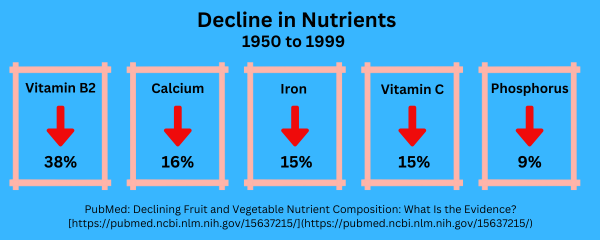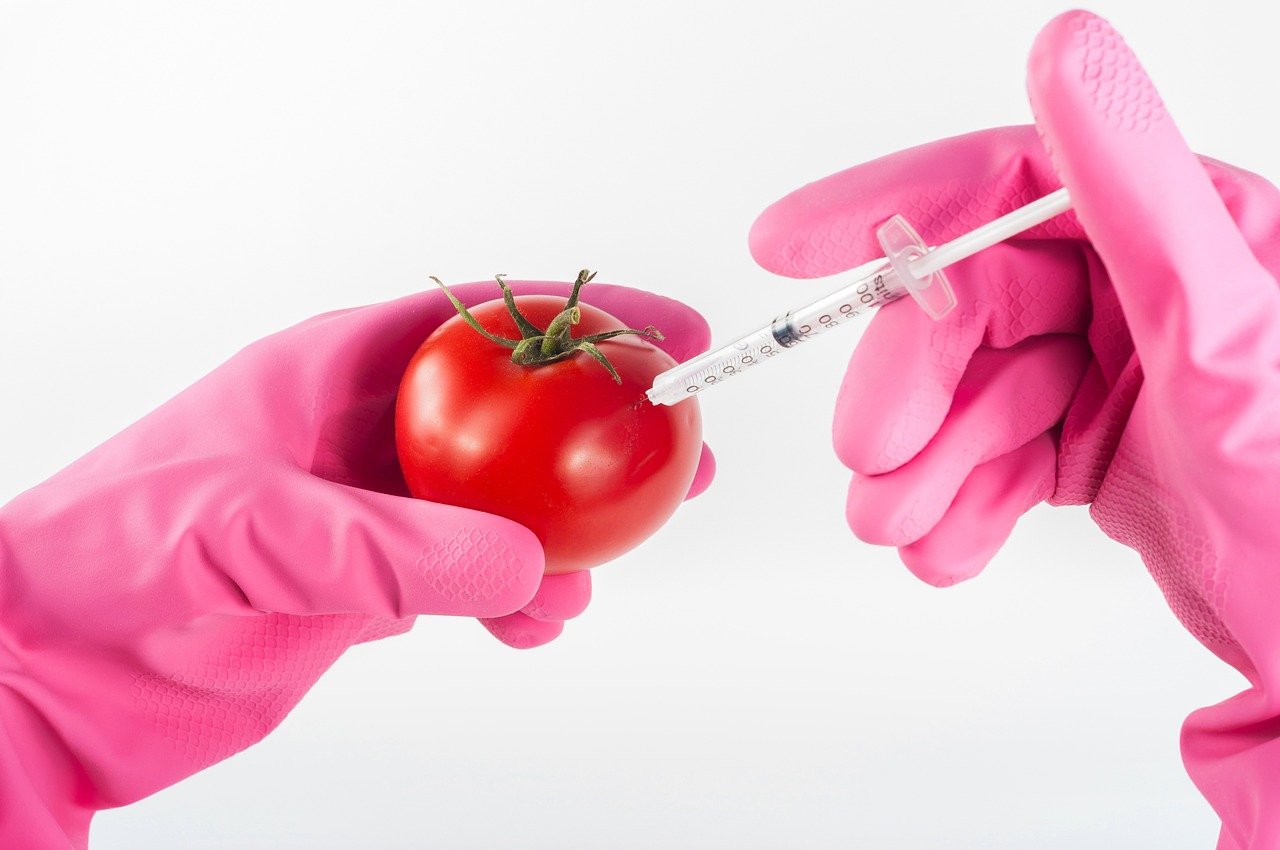The food we eat today may look the same as it did decades ago, but beneath the surface, its nutrient content has changed significantly. Due to shifts in agricultural practices, soil depletion, and the growing dominance of processed foods, many people are not receiving the vital nutrients their bodies need from food alone.
One article cites that you would need to eat 27 apples today in order to get the same amount of nutrients that you would have received eating a single apple in 1907. I cannot confirm or deny this, but we will explore scientific research that demonstrates that the nutritional value of our food today is not as high as it once was.
This growing concern is pushing more people to turn to vitamin and mineral supplements to bridge the gaps in their diets. In this article, we’ll explore why modern food isn’t as nutritious as it once was, the factors contributing to this decline, and why supplementation may be essential for optimal health.
I. The Decline in Nutrient Density of Modern Crops
Overview of the Issue

One of the most concerning trends in modern agriculture is the decline in the nutrient density of crops over time. Research has shown that over the past several decades, the mineral and vitamin content of fruits, vegetables, and grains has significantly decreased.
A comprehensive study published in the *Journal of the American College of Nutrition* examined 43 common crops grown between 1950 and 1999 and found significant declines in key nutrients. For example, levels of protein, calcium, phosphorus, iron, riboflavin (Vitamin B2), and Vitamin C decreased by 6% to 38% . These findings highlight a critical change in our food supply, one that is not immediately visible but has a profound impact on our health.
Why This Is Happening
The nutrient depletion in food crops can be attributed to several factors, most notably modern agricultural practices. Over the past century, farmers have increasingly prioritized crop yield — growing more food faster and bigger — at the expense of nutritional quality. This focus on quantity over quality has led to the following problems:
1. Soil Depletion: Modern farming techniques, including monoculture (growing the same crops year after year) and the excessive use of chemical fertilizers, have stripped soils of vital minerals. Without the proper nutrients in the soil, plants cannot absorb enough of them to pass on to the food we eat.
2. Chemical Inputs: Pesticides and synthetic fertilizers further deplete the soil of beneficial microorganisms that are critical for nutrient absorption. While these chemicals help plants grow faster and larger, they don’t contribute to the overall nutrient content.
3. Watering Practices: Overwatering and irrigation techniques often flush away essential minerals, leaving crops lacking in micronutrients.
II. Changes in Farming Practices and Their Effects on Nutrition
Conventional vs. Organic Farming
Another key factor contributing to nutrient depletion is the difference between conventional and organic farming practices. Historically, farming was predominantly organic, but modern agriculture has shifted towards mass production through conventional methods. Conventional farming often relies on chemical inputs to control pests and enhance growth, whereas organic farming emphasizes natural methods like crop rotation and composting, which can help replenish the soil.
Several studies have shown that organic crops tend to have higher nutrient content compared to their conventionally grown counterparts. For instance, organic fruits and vegetables often have higher levels of antioxidants, vitamin C, and minerals like magnesium and iron. However, organic farming still represents a small fraction of global agriculture, and the broader trend of nutrient decline persists across most food sources.
Genetic Modifications and Crop Engineering
Genetically modified organisms (GMOs) and crop engineering have also played a role in altering the nutrient profile of modern food. While GMOs have been designed to improve traits such as pest resistance, drought tolerance, and shelf life, their nutritional content is often compromised. For example, larger fruits and vegetables grown through selective breeding may have more water content but proportionally fewer nutrients. This is known as the “dilution effect,” where the faster and larger a crop grows, the fewer nutrients it accumulates.
III. The Modern Diet: Less Nutrient-Dense, More Processed
Shift to Processed Foods
In addition to changes in agricultural practices, the modern diet has shifted dramatically towards processed foods. These foods often contain fewer vitamins and minerals compared to whole, fresh produce. Instead, they are loaded with refined sugars, unhealthy fats, and artificial additives that offer little to no nutritional value.
This reliance on processed foods has contributed to a rise in nutrient deficiencies. For example, many processed grains are stripped of their outer layers, which contain essential nutrients like B vitamins, fiber, and minerals. Even though some foods are fortified to replace lost nutrients, these synthetic versions are often not as easily absorbed by the body.
Nutrient Loss During Food Processing
Food processing further exacerbates the problem by destroying or reducing the bioavailability of nutrients. Cooking, freezing, and canning can significantly degrade the content of vitamins such as B and C, while essential minerals like potassium and magnesium may be lost during refinement processes. For instance, milling whole wheat into white flour can reduce its magnesium content by up to 80%, leaving the final product nutritionally inferior .
IV. Supplementation as a Solution
The Role of Supplements in Modern Diets
Given the decline in food nutrient content and the increasing consumption of processed foods, it’s no surprise that many people turn to vitamin and mineral supplements to fill the gaps. Supplements can be especially beneficial for addressing common nutrient deficiencies such as:
– Vitamin D: Essential for bone health and immune function, Vitamin D is often deficient in people who spend little time outdoors.
– Magnesium: Critical for muscle function, energy production, and heart health, yet magnesium levels have declined in foods like grains and vegetables.
– Omega-3 Fatty Acids: Important for brain health and heart function, these are often lacking in diets high in processed foods.
Types of Supplements to Consider
High-quality supplements can help restore balance to nutrient-deficient diets. Key supplements to consider include:
– Multivitamins: A broad-spectrum multivitamin can help cover the basics for overall health.
– Vitamin C and Zinc: For immune support.
– Magnesium: To support muscle and nerve function, as well as energy production.
It’s important to choose supplements that are well-researched and come from reputable brands to ensure potency and bioavailability.
Caution: Not All Supplements Are Equal
While supplements can be incredibly beneficial, not all are created equal. It’s essential to opt for products that are third-party tested and made from bioavailable forms of nutrients. Moreover, over-supplementing can lead to toxicity or imbalances, so it’s important to consult with a healthcare provider before starting any supplementation regimen.
V. Addressing Common Misconceptions About Supplementation
I Don’t Need Supplements If I Eat a Balanced Diet
Many people believe that if they consume a well-rounded diet rich in fruits and vegetables, they don’t need supplements. However, due to the decline in food nutrient density, even a balanced diet may fall short of providing essential vitamins and minerals. While whole foods should always be the foundation of any diet, supplements can help ensure adequate intake of key nutrients.
Supplements Are a Quick Fix
Supplements are not a replacement for healthy eating but should complement a nutrient-rich diet. Relying solely on supplements without addressing dietary habits can lead to imbalances or missed opportunities to benefit from whole foods’ synergistic properties.
Conclusion
The food we eat today is not as nutrient-dense as it once was. Due to factors such as soil depletion, modern farming practices, and the rise of processed foods, many people are not getting the vitamins and minerals they need from their diet alone. While a balanced diet remains the cornerstone of good health, vitamin and mineral supplements can help fill the nutritional gaps left by modern food production. To ensure optimal health, it’s important to evaluate your dietary intake and consider supplementation as part of a comprehensive approach to nutrition.
This is my experience when I tested Multivitamins for Men by Performance Labs
References
– PubMed: Declining Fruit and Vegetable Nutrient Composition: What Is the Evidence? [https://pubmed.ncbi.nlm.nih.gov/15637215/](https://pubmed.ncbi.nlm.nih.gov/15637215/)
– Additional studies on food nutrient decline and its impact on public health.





